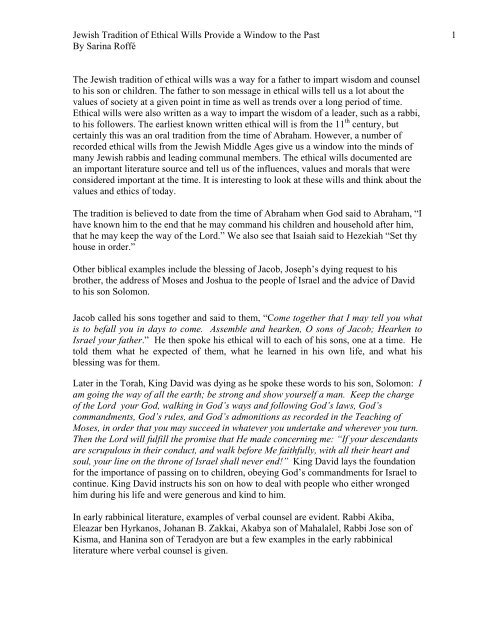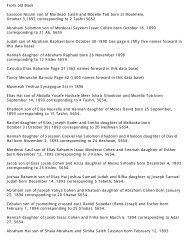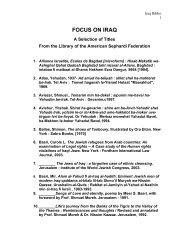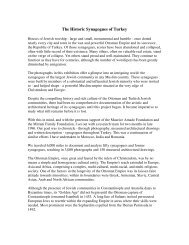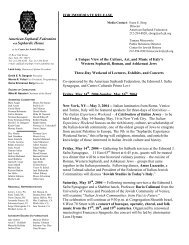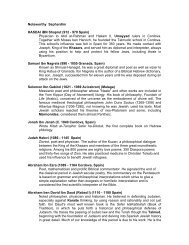Jewish Tradition of Ethical Wills Provide a Window to the Past 1 By ...
Jewish Tradition of Ethical Wills Provide a Window to the Past 1 By ...
Jewish Tradition of Ethical Wills Provide a Window to the Past 1 By ...
Create successful ePaper yourself
Turn your PDF publications into a flip-book with our unique Google optimized e-Paper software.
<strong>Jewish</strong> <strong>Tradition</strong> <strong>of</strong> <strong>Ethical</strong> <strong>Wills</strong> <strong>Provide</strong> a <strong>Window</strong> <strong>to</strong> <strong>the</strong> <strong>Past</strong> 1<br />
<strong>By</strong> Sarina R<strong>of</strong>fé<br />
The <strong>Jewish</strong> tradition <strong>of</strong> ethical wills was a way for a fa<strong>the</strong>r <strong>to</strong> impart wisdom and counsel<br />
<strong>to</strong> his son or children. The fa<strong>the</strong>r <strong>to</strong> son message in ethical wills tell us a lot about <strong>the</strong><br />
values <strong>of</strong> society at a given point in time as well as trends over a long period <strong>of</strong> time.<br />
<strong>Ethical</strong> wills were also written as a way <strong>to</strong> impart <strong>the</strong> wisdom <strong>of</strong> a leader, such as a rabbi,<br />
<strong>to</strong> his followers. The earliest known written ethical will is from <strong>the</strong> 11 th century, but<br />
certainly this was an oral tradition from <strong>the</strong> time <strong>of</strong> Abraham. However, a number <strong>of</strong><br />
recorded ethical wills from <strong>the</strong> <strong>Jewish</strong> Middle Ages give us a window in<strong>to</strong> <strong>the</strong> minds <strong>of</strong><br />
many <strong>Jewish</strong> rabbis and leading communal members. The ethical wills documented are<br />
an important literature source and tell us <strong>of</strong> <strong>the</strong> influences, values and morals that were<br />
considered important at <strong>the</strong> time. It is interesting <strong>to</strong> look at <strong>the</strong>se wills and think about <strong>the</strong><br />
values and ethics <strong>of</strong> <strong>to</strong>day.<br />
The tradition is believed <strong>to</strong> date from <strong>the</strong> time <strong>of</strong> Abraham when God said <strong>to</strong> Abraham, “I<br />
have known him <strong>to</strong> <strong>the</strong> end that he may command his children and household after him,<br />
that he may keep <strong>the</strong> way <strong>of</strong> <strong>the</strong> Lord.” We also see that Isaiah said <strong>to</strong> Hezekiah “Set thy<br />
house in order.”<br />
O<strong>the</strong>r biblical examples include <strong>the</strong> blessing <strong>of</strong> Jacob, Joseph’s dying request <strong>to</strong> his<br />
bro<strong>the</strong>r, <strong>the</strong> address <strong>of</strong> Moses and Joshua <strong>to</strong> <strong>the</strong> people <strong>of</strong> Israel and <strong>the</strong> advice <strong>of</strong> David<br />
<strong>to</strong> his son Solomon.<br />
Jacob called his sons <strong>to</strong>ge<strong>the</strong>r and said <strong>to</strong> <strong>the</strong>m, “Come <strong>to</strong>ge<strong>the</strong>r that I may tell you what<br />
is <strong>to</strong> befall you in days <strong>to</strong> come. Assemble and hearken, O sons <strong>of</strong> Jacob; Hearken <strong>to</strong><br />
Israel your fa<strong>the</strong>r.” He <strong>the</strong>n spoke his ethical will <strong>to</strong> each <strong>of</strong> his sons, one at a time. He<br />
<strong>to</strong>ld <strong>the</strong>m what he expected <strong>of</strong> <strong>the</strong>m, what he learned in his own life, and what his<br />
blessing was for <strong>the</strong>m.<br />
Later in <strong>the</strong> Torah, King David was dying as he spoke <strong>the</strong>se words <strong>to</strong> his son, Solomon: I<br />
am going <strong>the</strong> way <strong>of</strong> all <strong>the</strong> earth; be strong and show yourself a man. Keep <strong>the</strong> charge<br />
<strong>of</strong> <strong>the</strong> Lord your God, walking in God’s ways and following God’s laws, God’s<br />
commandments, God’s rules, and God’s admonitions as recorded in <strong>the</strong> Teaching <strong>of</strong><br />
Moses, in order that you may succeed in whatever you undertake and wherever you turn.<br />
Then <strong>the</strong> Lord will fulfill <strong>the</strong> promise that He made concerning me: “If your descendants<br />
are scrupulous in <strong>the</strong>ir conduct, and walk before Me faithfully, with all <strong>the</strong>ir heart and<br />
soul, your line on <strong>the</strong> throne <strong>of</strong> Israel shall never end!” King David lays <strong>the</strong> foundation<br />
for <strong>the</strong> importance <strong>of</strong> passing on <strong>to</strong> children, obeying God’s commandments for Israel <strong>to</strong><br />
continue. King David instructs his son on how <strong>to</strong> deal with people who ei<strong>the</strong>r wronged<br />
him during his life and were generous and kind <strong>to</strong> him.<br />
In early rabbinical literature, examples <strong>of</strong> verbal counsel are evident. Rabbi Akiba,<br />
Eleazar ben Hyrkanos, Johanan B. Zakkai, Akabya son <strong>of</strong> Mahalalel, Rabbi Jose son <strong>of</strong><br />
Kisma, and Hanina son <strong>of</strong> Teradyon are but a few examples in <strong>the</strong> early rabbinical<br />
literature where verbal counsel is given.
<strong>Jewish</strong> <strong>Tradition</strong> <strong>of</strong> <strong>Ethical</strong> <strong>Wills</strong> <strong>Provide</strong> a <strong>Window</strong> <strong>to</strong> <strong>the</strong> <strong>Past</strong> 2<br />
<strong>By</strong> Sarina R<strong>of</strong>fé<br />
The idea <strong>of</strong> imparting certain values <strong>to</strong> <strong>the</strong> next generation is so important in <strong>Jewish</strong><br />
genre that at times it takes on more importance than Torah study. A widespread belief is<br />
that a person’s acts during life are <strong>the</strong> only things that will follow you in <strong>the</strong> world <strong>to</strong><br />
come (Abrahams 9). This is a philosophical issue raised by Maimonides in his writings.<br />
At <strong>the</strong> time many people believed that <strong>the</strong> messianic age and <strong>the</strong> world <strong>to</strong> come were<br />
combined; that <strong>the</strong> Messiah comes and resurrects those who deserve <strong>to</strong> be resurrected and<br />
those who deserve it will live in <strong>the</strong> world <strong>to</strong> come with body and soul. Maimonides<br />
breaks with this belief and writes that <strong>to</strong> be in <strong>the</strong> world <strong>to</strong> come one need not have a<br />
body, but ra<strong>the</strong>r an incorporeal soul in relationship with <strong>the</strong> divine. Maimonides applies<br />
philosophic knowledge <strong>to</strong> <strong>the</strong> Talmud and believes that <strong>the</strong> rational part <strong>of</strong> soul can live<br />
on eternally basking in <strong>the</strong> radiance <strong>of</strong> <strong>the</strong> divine (after death).<br />
In looking at <strong>Ethical</strong> <strong>Wills</strong>, we can see that <strong>the</strong> importance <strong>of</strong> a person’s acts during his<br />
lifetime are or paramount importance because <strong>the</strong>y are believed <strong>to</strong> be <strong>the</strong> determining<br />
fac<strong>to</strong>r for what happens <strong>to</strong> a person after death in <strong>the</strong> world <strong>to</strong> come. For example, Judah<br />
ha-Nasi tells his sons <strong>to</strong> help <strong>the</strong>ir mo<strong>the</strong>r, especially for <strong>the</strong> Sabbath, appointing each <strong>of</strong><br />
<strong>the</strong>m a role. Here we see <strong>the</strong> importance <strong>of</strong> <strong>the</strong> commandment “Honor thy mo<strong>the</strong>r and thy<br />
fa<strong>the</strong>r.”<br />
Rabbi Nehanya ben Hakana says “I never won honor at <strong>the</strong> cost <strong>of</strong> a colleague,” in<br />
essence telling his son not <strong>to</strong> curse fellow man or <strong>to</strong> advance himself at <strong>the</strong> cost <strong>of</strong><br />
ano<strong>the</strong>r. He also says he was generous with his money. Rabbi Nehanya <strong>the</strong> Great tells his<br />
son that he was generous with his money, and that he never accepted presents or “exacted<br />
retaliation.” Rabbi Zera never lost his temper at home or slept in <strong>the</strong> Bet Hamidrash.<br />
These examples tell us <strong>of</strong> <strong>the</strong> importance <strong>of</strong> respect for a parent and for holy places. In<br />
addition, not accepting presents and being generous with money are examples <strong>of</strong> <strong>the</strong><br />
importance <strong>of</strong> tzedekah.<br />
Rabbi Eleazar <strong>the</strong> Great (ben Isaac <strong>of</strong> Worms, mid-11 th Century) writes Paths <strong>of</strong> Liberty.<br />
When he is near death, he realizes his mistakes as a fa<strong>the</strong>r and wants <strong>to</strong> make up for it. In<br />
his testament, he lists all kinds <strong>of</strong> things his son should do from reciting <strong>the</strong> Shema at <strong>the</strong><br />
proper hour <strong>to</strong> keeping water at <strong>the</strong> bedside so that you can wash your hands quickly in<br />
<strong>the</strong> morning when you get up. Most <strong>of</strong> <strong>the</strong> items in his list are things we know <strong>of</strong> <strong>to</strong>day as<br />
good and righteous acts or following commandments - keeping <strong>the</strong> Sabbath, such as<br />
visiting <strong>the</strong> sick, consoling mourners, honoring <strong>the</strong> poor and keeping confidences. Rabbi<br />
Eleazar’s will shows <strong>the</strong> piety <strong>of</strong> his Ashkenazic and German culture.<br />
We can also see that each <strong>of</strong> <strong>the</strong>se ethical wills take on a different <strong>to</strong>ne, depending on <strong>the</strong><br />
author and <strong>the</strong> message. For example, Judah ibn Tibbon writes A Fa<strong>the</strong>r’s Admonition <strong>to</strong><br />
his son, which in essence is pages and pages <strong>of</strong> imparting <strong>Jewish</strong> guilt on his son, telling<br />
him <strong>of</strong> all <strong>the</strong> sacrifices ibn Tibbon made for his son’s benefit. What is interesting in Ibn<br />
Tibbon’s Admonition is that we can see some important Judeo-Arabic influences. For<br />
example, ibn Tibbon tells <strong>of</strong> <strong>the</strong> importance <strong>of</strong> Arabian philosophers, <strong>the</strong> sciences, ethics,<br />
and physics (62). He also tells his son <strong>the</strong> importance <strong>of</strong> knowing Arabic so that<br />
translations can be done, as well as <strong>the</strong> importance <strong>of</strong> using quality writing <strong>to</strong>ols. Ibn
<strong>Jewish</strong> <strong>Tradition</strong> <strong>of</strong> <strong>Ethical</strong> <strong>Wills</strong> <strong>Provide</strong> a <strong>Window</strong> <strong>to</strong> <strong>the</strong> <strong>Past</strong> 3<br />
<strong>By</strong> Sarina R<strong>of</strong>fé<br />
Tibbon also writes some poetry, obviously <strong>the</strong> influence <strong>of</strong> his roots in Muslim Spain<br />
when Arabic poetry was translated in<strong>to</strong> Hebrew and <strong>the</strong> subsequent new genre <strong>of</strong> Hebrew<br />
poetry. Ibn Tibbon also speaks with <strong>the</strong> voice <strong>of</strong> a cultured Spanish Jew and indeed his<br />
son goes on <strong>to</strong> be quite successful as a transla<strong>to</strong>r.<br />
Nahmanides (b. 1195) writes <strong>the</strong> Virtue <strong>of</strong> Humility, indeed an important contirbution <strong>to</strong><br />
<strong>Jewish</strong> literature, when writing <strong>to</strong> his sons after he is forced <strong>to</strong> leave Spain in 1267 due <strong>to</strong><br />
his arguments in <strong>the</strong> Barcelona Disputations <strong>of</strong> 1263. He writes letters <strong>to</strong> his sons,<br />
especially his second son who has a position in <strong>the</strong> Castillian court. Nahmanides is very<br />
well versed, if not brilliant as seen from his ability <strong>to</strong> weave <strong>to</strong>ge<strong>the</strong>r different Torah<br />
sources for argument’s sake. He tells us <strong>the</strong> importance <strong>of</strong> knowledge and <strong>of</strong> learning and<br />
<strong>the</strong> reflection this has on a person’s individual acts. For example, someone who is poor<br />
and sins is innocent; a person who has knowledge and sins has no excuse, for <strong>the</strong>y sinned<br />
with <strong>the</strong> knowledge <strong>the</strong>y were doing something wrong. This tells us that ignorance makes<br />
sin excusable, but it’s not an excuse <strong>to</strong> sin if you know what you did is wrong. The<br />
Ramban also espouses <strong>the</strong> importance <strong>of</strong> humility, a character trait Jews have come <strong>to</strong><br />
value.<br />
Nachmanides wrote “Accus<strong>to</strong>m yourself <strong>to</strong> speak in gentleness <strong>to</strong> all men, at all times.<br />
Thus will you be saved from anger, <strong>the</strong> fertile cause <strong>of</strong> sin... Remove anger from thy<br />
heart, and put away evil from thy flesh.” Nachmanides concludes with, “Read this Letter<br />
once a week, and be as regular in carrying out its injunctions, by its aid walking forever<br />
after <strong>the</strong> Lord, blessed be He; that thou mayest prosper in all thy ways, and be held<br />
worthy <strong>of</strong> all <strong>the</strong> good which is treasured up for <strong>the</strong> righteous.” Like Rabbi Nehanya ben<br />
Hakana and Maimonides (next paragraph), Nahmanides instructions about avoiding<br />
anger, are seen over and over again in numerous ethical wills from this period.<br />
The Gates <strong>of</strong> Instruction is attributed <strong>to</strong> Maimonides and is an example <strong>of</strong> his ability <strong>to</strong><br />
paraphrase and weave different sources in<strong>to</strong> a composition. There is some doubt about<br />
<strong>the</strong> attribution, largely because <strong>the</strong> address is <strong>to</strong> ‘children’ and Maimonides is believed <strong>to</strong><br />
have had only one son. Yet, <strong>the</strong>re are style issues that appear <strong>to</strong> derive from Maimonides,<br />
such as <strong>the</strong> concept <strong>of</strong> free will (104). Also, <strong>the</strong> writer quotes from <strong>the</strong> Guide <strong>to</strong> <strong>the</strong><br />
Perplexed and <strong>the</strong> Torah.<br />
Gates is an example <strong>of</strong> a type <strong>of</strong> ethical will, instructing people how <strong>to</strong> act, <strong>to</strong> control<br />
anger and above all <strong>to</strong> be honest. For example, Maimonides attributes his prosperity <strong>to</strong><br />
his faith in God that this faith gave him authority over o<strong>the</strong>rs that he felt were greater<br />
than him and that this same faith “introduced me in<strong>to</strong> places where my kinsmen could not<br />
admit me (109).” Honesty is <strong>to</strong>uched on over and over again such that one man should<br />
not pr<strong>of</strong>it dishonestly, that man should have integrity, not take what doesn’t belong <strong>to</strong><br />
him, and that <strong>the</strong> word <strong>of</strong> a man should be as good as if it is written.<br />
The Rule <strong>of</strong> Paths <strong>of</strong> Light by Rabbi Yehiel Asher (b. 1210) – <strong>the</strong> Rosh – also espouses<br />
some <strong>of</strong> <strong>the</strong> same values, honesty and <strong>the</strong> treatment <strong>of</strong> fellow man. “Raise not thine hand<br />
against thy neighbor. Circulate no false reports; slander no man (121).” “Never utter a
<strong>Jewish</strong> <strong>Tradition</strong> <strong>of</strong> <strong>Ethical</strong> <strong>Wills</strong> <strong>Provide</strong> a <strong>Window</strong> <strong>to</strong> <strong>the</strong> <strong>Past</strong> 4<br />
<strong>By</strong> Sarina R<strong>of</strong>fé<br />
falsehood (122).” Asher also imparts <strong>the</strong> importance <strong>of</strong> tzedekeh, <strong>of</strong> kindness, <strong>of</strong><br />
controlling anger, but most importantly, <strong>of</strong> faith and prayer. Like Nahmanides and<br />
Maimonides, Asher leaves Spain. Yet <strong>the</strong> values imparted by Maimonides and<br />
Nahmanides were clearly an influence for here again we see <strong>the</strong> repetition <strong>of</strong> <strong>the</strong> idea <strong>of</strong><br />
honesty and controlling anger, among o<strong>the</strong>r things.<br />
An ethical will written by Asher’s grandson, Judah Asheri, who returns <strong>to</strong> Spain and<br />
becomes Chief Rabbi <strong>of</strong> Toledo, indicates a Spanish influence, as does <strong>the</strong> ethical will <strong>of</strong><br />
his bro<strong>the</strong>r Jacob Asheri. Both indicate <strong>the</strong> need <strong>to</strong> read Torah aloud and have a<br />
scrupulous regard for ceremony, piety with sincere spirituality, as well as a stress on<br />
scrupulous observance <strong>of</strong> dietary law.<br />
Judah Asheri uses a different way <strong>of</strong> imparting his will. He tells his life s<strong>to</strong>ry, explaining<br />
lessons he has learned along <strong>the</strong> way and observations he has made <strong>of</strong> o<strong>the</strong>rs who are not<br />
obeying <strong>the</strong> laws and not paying attention <strong>to</strong> <strong>the</strong> plain meaning <strong>of</strong> Torah. He spends a lot<br />
<strong>of</strong> time explaining finances and how things are <strong>to</strong> be accounted for, that <strong>the</strong> ti<strong>the</strong> must be<br />
observed and that one must not accept gifts.<br />
Joseph Ibn Kaspi (b. 1280) writes <strong>the</strong> Guide <strong>to</strong> Knowledge as a testament when he was in<br />
his fifties. As a traveler, ibn Kaspi wanted <strong>to</strong> impart certain values <strong>to</strong> his children. Again<br />
we see <strong>the</strong> influence <strong>of</strong> Maimonides in that ibn Kaspi quotes from <strong>the</strong> Guide. Ibn Kaspi’s<br />
testament is important because it claims that Aris<strong>to</strong>tle was influenced by early <strong>Jewish</strong><br />
sources. We know that Aris<strong>to</strong>tle’s philosophy was an important and significant influence<br />
<strong>to</strong> Maimonides, but here Ibn Kaspi leads us <strong>to</strong> think that <strong>the</strong> reasoning for that is because<br />
Aris<strong>to</strong>tle himself was influenced by Judaism during his lifetime.<br />
Ibn Kaspi’s testament is ra<strong>the</strong>r long philosophical work, largely about <strong>the</strong> philosophical<br />
justification for religion, which he bases on four precepts from <strong>the</strong> Ramban’s Book <strong>of</strong><br />
Commandments. Although <strong>the</strong> Rambam had 10 precepts, for some unknown reason, Ibn<br />
Kaspi chooses <strong>the</strong>se: <strong>to</strong> know that <strong>the</strong>re is a First Cause; <strong>to</strong> recognize that He is One; <strong>to</strong><br />
love Him and; <strong>to</strong> fear Him.<br />
Ibn Kaspi was certainly influenced by <strong>the</strong> writings <strong>of</strong> Maimonides and <strong>the</strong> philosophic<br />
discussions <strong>of</strong> <strong>the</strong> time period, as evidenced by his lengthy discussion <strong>of</strong> <strong>the</strong> four precepts<br />
as <strong>the</strong> basis for his entire testament. While <strong>the</strong> commonly held <strong>Jewish</strong> belief is that God<br />
was <strong>the</strong> source <strong>of</strong> everything in life, including Judaism, it is also proven that Maimonides<br />
believed that philosophy could be justified by religion, and that <strong>the</strong>re had <strong>to</strong> be a<br />
symbiosis between <strong>the</strong> two.<br />
In Ideals <strong>of</strong> an Average Jew, Eleazar <strong>of</strong> Mayence writes a testament (@1357). His main<br />
concerns are that his daughters observe <strong>the</strong> laws <strong>of</strong> modesty, and that all his children pray<br />
regularly, conduct <strong>the</strong>ir business honestly, avoid Lashon Hora, keep <strong>the</strong> Sabbath and<br />
honor <strong>the</strong>ir spouse. Overall, he stresses anger management, something seen in many o<strong>the</strong>r<br />
ethical wills, <strong>the</strong> idea that one should not quarrel; also cleanliness with <strong>the</strong> ideal that if<br />
one studies Torah, good qualities become habitual. Mayence speaks with <strong>the</strong> voice <strong>of</strong> a
<strong>Jewish</strong> <strong>Tradition</strong> <strong>of</strong> <strong>Ethical</strong> <strong>Wills</strong> <strong>Provide</strong> a <strong>Window</strong> <strong>to</strong> <strong>the</strong> <strong>Past</strong> 5<br />
<strong>By</strong> Sarina R<strong>of</strong>fé<br />
very pious Ashkenazic German Jew, but again this idea <strong>of</strong> anger management, <strong>the</strong> same<br />
as in Nahmanides’ and Maimonides’ messages, is <strong>the</strong> same. Mayence would have had <strong>the</strong><br />
advantage <strong>of</strong> reading translations <strong>of</strong> Maimonides’ work in German, indicating <strong>the</strong><br />
Sephardic influence in Germany..<br />
Solomon son <strong>of</strong> Isaac implores a Regiment <strong>of</strong> Self-Taxation and <strong>the</strong> ideal that a family<br />
must support at least one person and his family so that he can study full time.<br />
Ongoing <strong>the</strong>mes in <strong>the</strong> ethical wills are <strong>the</strong> importance <strong>of</strong> honesty, faith, piety, and<br />
treatment <strong>to</strong> fellow man. The foundation for many <strong>of</strong> <strong>the</strong> traditions we live by <strong>to</strong>day<br />
appear <strong>to</strong> come from many <strong>of</strong> <strong>the</strong>se ethical wills. The ethical wills, when taken as a body<br />
<strong>of</strong> literature, show that one does not have <strong>to</strong> be wealthy <strong>to</strong> leave a legacy and <strong>the</strong> wills<br />
give us a crucial window in<strong>to</strong> <strong>the</strong> minds <strong>of</strong> <strong>the</strong> writer. They tell us <strong>of</strong> <strong>the</strong> importance <strong>of</strong><br />
<strong>Jewish</strong> values such as kindness, prayer, tzedekah, honesty, ethics and prayer. They also<br />
tell us that <strong>the</strong> Torah is <strong>the</strong> source <strong>of</strong> many traditions and that philosophy was infiltrating<br />
<strong>Jewish</strong> society more and more. We also see that <strong>the</strong> early words <strong>of</strong> King David have set<br />
<strong>the</strong> <strong>to</strong>ne for this important <strong>Jewish</strong> genre. Indeed, King David’s words and instructions are<br />
being followed during this time period because <strong>of</strong> <strong>the</strong> hope <strong>of</strong> redemption and <strong>the</strong> return<br />
<strong>to</strong> Eretz Israel.<br />
Source: Hebrew <strong>Ethical</strong> <strong>Wills</strong> by Israel Abrahams


